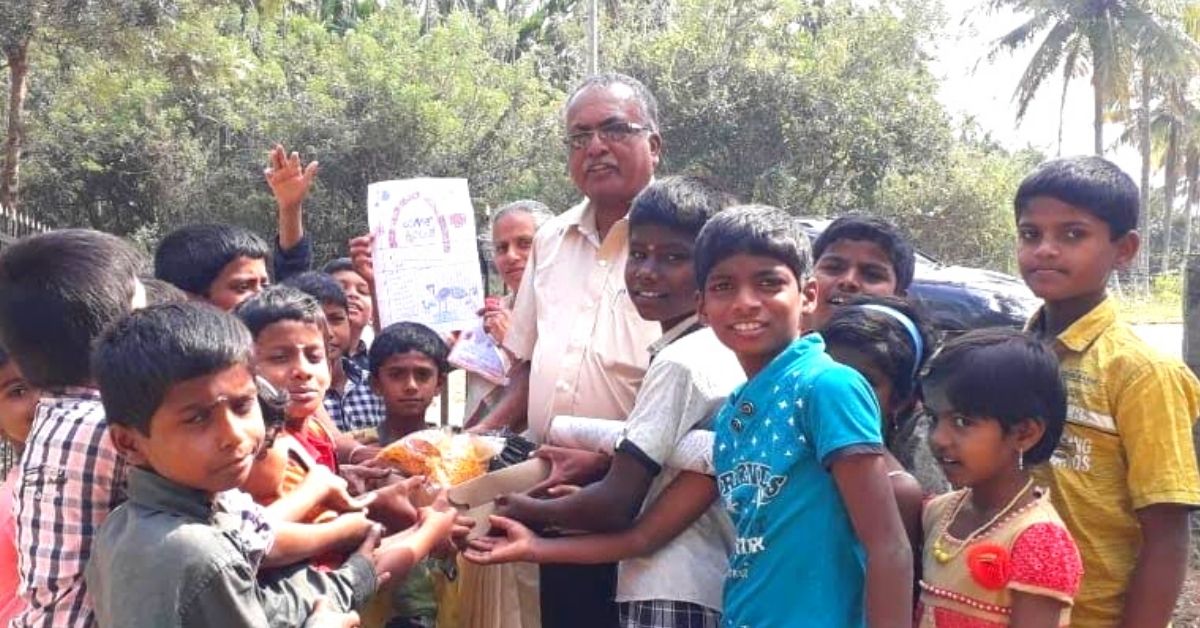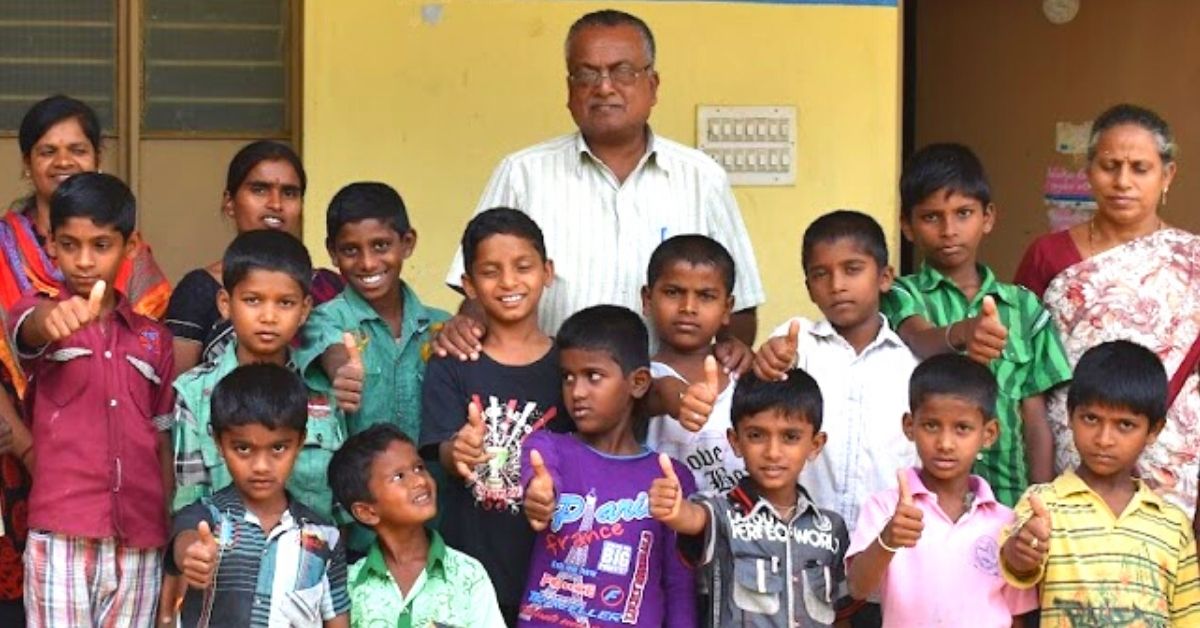Child Labourer at 12, Unsung Hero Dedicates 30 Years to Rescue 1500 Kids
A N Varghese is a social activist and once a victim of child labour who is now helping other children fight the evil practice in Chikmagalur's coffee plantations through his NGO, Vikasana.

Karnataka’s Chikmagalur district is every nature lover’s dream, with an abundance of scenic landscapes, water streams, wildlife, and dense coffee bushes. However, underneath this paradise lies the harsh reality of child labour. Amid these very blossoming plantations, children have been plucking coffee seeds from bushes where adults cannot reach for decades.
Having grown up in the region, A N Varghese, a social activist, was always aware of the illegal practice and its repercussions. He had been a victim of child labour as well, and wanted to work to eradicate it.
Varghese’s father was a construction worker who could barely manage to feed the family of four on most days. When Varghese was in Class 7, his father asked him to join the construction site so the family could have an additional source of income. While the young boy did oblige, he put forth the condition that his education wouldn’t be affected. So he juggled his studies and work while completing his post-graduation in sociology.
“At first, I wanted to go to school so that I could be with my friends. But when I understood the importance of education, I wanted to stay. On some days, I would have to skip school to study, but covered up by studying twice as hard. The pressure to quit school was immense, but I would divide my time by working during the day and studying at night. My working conditions were not very healthy, with long hours and minimal pay, but I knew with good marks, I could turn things around for myself.”
As he grew older, he worked with various NGOs outside Chikmagalur in the field of child and women welfare for ten years. “I started my organisation, Vikasana, in 1989 to bring a change in my hometown,” he tells The Better India.
His experiences, knowledge of the region and strong advocacy for education shaped the foundation of his social work. From creating awareness to organising campaigns, lobbying, and establishing schools for rescued children, Varghese and his team of seven board members have worked extensively over the last three decades to eliminate child labour from the district.

According to Varghese, his NGO has rescued and rehabilitated 1,500 children so far, of which several have gone on to become lawyers, nurses, engineers, teachers and more.
Giving children their childhood back
While Varghese was always privy to the problem of child labour, he was appalled to learn the true extent of this evil. According to a survey conducted between 1990 and 2001 by Vikasana, nearly 3,000 children had been employed in coffee estates, brick kilns and areca nut processing units across the state. The survey was conducted in collaboration with the state government under their initiative for ‘Campaign Against Child Labour’.
In fact, in India, it’s no secret that children are forced to work for long hours while regularly being exposed to health and safety hazards. Some as young as six are often forced into labour as they are easy to exploit, amount to cheap labour and don’t mind working overtime if it means affording just one meal a day. Parents withdraw children from school believing that education is not going to end the cycle of poverty.
“Parents are also trapped in bonded labour through debt peonage. Low minimum wage leads to them having to take loans from employers to cope up with inflated prices. Their children have to bear the brunt by working for generations. Rescuing children from such conditions is not as easy as it may sound,” says Varghese.
So Vikasana has adopted a four-pronged approach – rescue, counselling, rehabilitation and intuition – to help the children.
The first step is to identify children under 18 working as labourers in plantations, fields and other places with the help of self-help groups, anganwadi workers, local officials, school teachers and police.
Making parents and employers understand the evils of this practice is the most challenging bit, says Varghese. “We explain the effects of child labour on the kid’s mental and physical well-being, and counsel parents. If this does not work, we resort to legal action under The Child Labour (Prohibition and Regulation) Act of 1986. Under this, the punishment for employing children can include jail time for up to three years and a hefty penalty up to Rs 50,000. We also show them evidence of the complaints registered in the past to send a stern message. Then, the child is rescued and brought to the Vikasana Child Labour Rehabilitation Center where they undergo counselling and skill development training. We provide food, clothing, and shelter until the child is ready to go back to school again.”
In cases where the education gap due to poverty, single parenthood, and dropout rates is huge, the NGO takes tuition and facilitates mentoring with elder children. The end goal is to reinstate the children back in school. At present, there are 23 boys and 30 girls being rehabilitated at the centre.
The final step is the reinstitution of the child with the family and ensuring they don’t fall back into the trap of child labour. The NGO conducts regular follow-up sessions. In cases where employers are using the force of power, the local Child Welfare Committee (CWC) is alerted.
Varghese started two schools and shelter homes in Chattanahalli and Duglapura villages for children with single mothers or those from extremely destitute families. With the support of ASHA, children from Classes 1 to 10 are given education.
Breaking the cycle of poverty
Sunil was in Class 2 when he dropped out of school due to extreme poverty. His parents were farm labourers who were forced to work long hours to feed the family.
“Instead of studying and playing with other children of my age, I was rearing goats and sheep under our employer when I turned six. I was rescued by Varghese sir, who convinced my parents that our incomes would be higher if I got an education. I am glad my parents agreed. I stayed in their shelter home till class 10. Education changed my world and helped me break the cycle of poverty,” says Sunil, now 29 and an automobile engineer at a private firm in Bengaluru.
Like Sunil, the financial conditions of many rescued children have improved, thanks to proper education. This in turn is inspiring this generation of parents to enrol their children in school.
“Our children are now working as nurses, teachers, school principals, cab drivers, computer operators, engineers and more. Compared to the previous decade, child labour has reduced approximately by 50% in the district as far as our knowledge goes,” Varghese notes.
Get in touch with Varghese here
Edited by Divya Sethu
If you found our stories insightful, informative, or even just enjoyable, we invite you to consider making a voluntary payment to support the work we do at The Better India. Your contribution helps us continue producing quality content that educates, inspires, and drives positive change.
Choose one of the payment options below for your contribution-
By paying for the stories you value, you directly contribute to sustaining our efforts focused on making a difference in the world. Together, let’s ensure that impactful stories continue to be told and shared, enriching lives and communities alike.
Thank you for your support. Here are some frequently asked questions you might find helpful to know why you are contributing?


This story made me
-
97
-
121
-
89
-
167













